Theresa May's first year as PM: Shropshire and Mid Wales MPs give their verdict
If a week is a long time in politics, then a year must seem like a lifetime. For Theresa May it was all going so well.
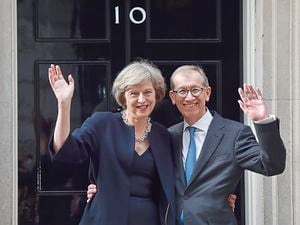
She was ushered into Downing Street unopposed after seeing Boris Johnson and Andrea Leadsom withdraw from the Conservative Party leadership race following David Cameron’s resignation after losing the EU referendum.
Her campaign had been run by the wily South Staffordshire MP Gavin Williamson who up to that point had been Cameron’s eyes and ears in parliament.
It was one year ago today that Mrs May was appointed Prime Minister by the Queen.
She gave a powerful speech about social ‘burning injustices’ on the steps of No 10.
“I know you’re working around the clock,” she said.
“I know you’re doing your best, and I know that sometimes life can be a struggle.
“The government I lead will be driven not by the interests of the privileged few, but by yours.”
With her reputation for steely purpose and resilience, Mrs May seemed a good choice.
She had not only survived six years as Home Secretary but flourished in a department that has the ability to kill off political careers every morning before breakfast.
She was also a reluctant Remainer with plenty of scepticism towards the EU to appease the Brexiteers and Remainers in the Tory ranks.
“Brexit means Brexit,” she said.
As Prime Minister she lacked the polish and slick oratory performances of her predecessor, but that was seen – at the time – to be an endearing feature.
Her Cabinet appointments created a stir, with Boris Johnson being named as Foreign Secretary and Liam Fox as International Trade Secretary.
Showing her mettle she made one of her first acts as PM to travel to Scotland and meet the nationalist First Minister Nicola Sturgeon.
Then came the summer recess after one of the most remarkable periods in British politics.
She enjoyed an unprecedented honeymoon. She remained unscathed as she revealed controversial plans to lift the ban on grammar schools.
Similarly, even losing in the High Court and Supreme Court to anti-Brexit campaigner Gina Miller didn’t derail her premiership.
In January she became the first world leader to meet new US President Donald Trump – a move that appalled the left, prompting much hyperbole.
And she went on to win every vote on Brexit in the Commons – again marshalled by Mr Williamson who was now her Chief Whip.
Then on March 29, she triggered Article 50 – the mechanism for leaving the European Union.
During the Easter recess, Mrs May and her husband Philip went for a walk among the Welsh hills.
It was there, she said, that she decided to call a snap General Election citing opposition to Brexit.
“Our opponents believe that because the Government’s majority is so small, our resolve will weaken and that they can force us to change course.
“They are wrong. They underestimate our determination to get the job done and I am not prepared to let them endanger the security of millions of working people across the country.”
At the time, the Conservatives were 23 points ahead of Jeremy Corbyn’s Labour in the opinion polls.
She was seeking a landslide. And a short campaign would reduce any risk.
Or so she thought.
At the time, Paul Nuttall, the then-Ukip leader, remarked: “The Prime Minister seems to be enjoying the longest honeymoon in British political history. Her levels of support is like nothing we have seen since National Government territory.”
But very quickly things started to go wrong.
Mrs May – or perhaps more pertinently her two closest advisers – wanted the campaign to be focused on Brexit.
The economy – and Chancellor Philip Hammond – were sidelined.
While Jeremy Corbyn went around the country addressing large groups of students promising to scrap tuition fees and cancel debt, Mrs May’s visits tended to be high-controlled and low key affairs at businesses or addressing party members.
Her answers to questions were rehearsed, robotic and repetitive.
The Tories’ had made the entire campaign about Mrs May – having her face plastered on all literature across the country, saying she was ‘strong and stable’.
That backfired massively.
The PM quickly had to U-turn on a manifesto pledge to effectively force the sick to sell their homes to plug a lack of funding for social care.
The so-called Dementia Tax was a disaster for the party.
Further Tory wobbles on the pensions triple lock and tax increases meant the elderly and core vote were alienated.
Terror attacks in Manchester and London, exploited by Mr Corbyn, brought into sharp focus the cuts Mrs May had made to police numbers as Home Secretary. The party of law and order had no response.
Mr Corbyn – whose manifesto promised rainbows, gold and utopia – mopped up the youth vote and middle class public sector workers irked at austerity.
As the Tory Lichfield MP Michael Fabricant said: “Our manifesto was even more depressing than the Book of Revelations.”
In the biggest turnaround in recent British political history, the electorate delivered a hung parliament.
Mrs May stayed in No 10 but had to buy off the Northern Irish Democratic Unionists to the tune of £1 billion to create a wafer-thin majority.
In the space of six weeks she spectacularly went from hero to zero.
And the Conservatives went from a position of strength to weakness.
Unlike Cameron, she has held her hands up for the mistakes and is determined to get on with the job.
Tory MPs have been left furious.
It is widely accepted Mrs May will not fight the next election as PM, scheduled for 2022.
Labour deputy leader Tom Watson – the West Bromwich East MP – said: “After one year – and one general election she said she wouldn’t call – the Prime Minister’s reputation is in tatters because the British people saw through her.
“When a Prime Minister’s credibility is lost it can never be recovered.
“That’s why Labour remains on an election footing.
“Theresa May is unlikely to be celebrating many more anniversaries in No 10.”
But MPs in Shropshire and Mid Wales have been much more supportive of Mrs May.
Montgomeryshire MP Glyn Davies, who welcomed the now-PM to a farm near his home in the run-up to the Brexit vote, said she was a hard-working and dedicated politician who deserved more respect.
He said: “I have known her for a very long time. A dedicated, compassionate, determined politician is how I know her. And very resilient. No-one better to see Brexit through, even though she was a remainer.
“Two things do make me cross though, and I am not often cross.
“The way she has been treated seems very unfair to me. And I cannot tolerate disloyalty. We hang together or we will surely hang separately.”
And Wrekin MP Mark Pritchard said he believes her position is growing stronger each day.
He added: “Whilst some newspapers maybe awash with leadership speculation, there is no appetite for a leadership race.”
Of course, this does not stop the lack of preparation by some in Labour to accept the outcome of the general election. The Conservatives won and Labour lost. That is it.
While minority government’s are rare to the UK, they are not rare in Europe or around the world. They are challenging but they still do provide government which works. This Conservative minority government will work.
For the time being the only thing that will keep her in the job for another year is the fear that a change of leadership so soon would heighten calls for another snap election, which Jeremy Corbyn could well win.
But after a year that saw Brexit, the election of President Trump, and the resurrection of JC – who can honestly predict what will happen next?
What our MP's think about Theresa May's first year as PM
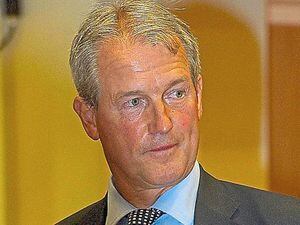
Owen Paterson, North Shropshire
Owen Paterson said he was pleased with Mrs May’s progress in the last 12 months, particularly on Brexit.
“If you had asked told me 12 months that we would have Article 50 voted through the House of Commons already I would have been very sceptical,” he said.
“The vote means that we will leave Europe in March 2019.
“The Queen’s Speech was voted through with not a single vote against or an abstain while a Labour amendment to stay in the Customs Union was defeated.”
Mr Paterson said Mrs May had also served a notice period of two years to exit the 1964 agreement.
This will take Britain out of the 1964 London convention which allows European fishing vessels to access waters six to twelve nautical miles from British shores.
“These are all major achievements.
“Brexit was the major task faced by the Prime Minister and she has pursued the task in hand.
“I think this is a huge achievement for her.
“If we do not deliver this, if we do not deliver Brexit then the economy, all sectors of the economy, will be in real trouble.
“I think that she has done extremely well to get this far.
“There is still a long way to go.
“These are the first steps in what is a major task for the Government.
Mr Paterson also defended Theresa May’s move to work with the DUP to form a government.
“I don’t think it’s actually a bad thing at all, considering one of the most contentious issues will be the Irish border, to have the DUP involved with people on the ground who quite rightly want to maintain a common travel area and maintain the easiest possible free movement of goods and services and people, which is exactly what we all want,” he said.
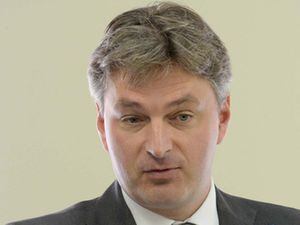
Daniel Kawczynski, Shrewsbury
Daniel Kawczynski says that knows the 2017 General Election did not exactly go to plan for all the political parties – but he feels that Theresa May is the person best placed to lead the country through these turbulent times.
Mrs May stepped in to heavy shoes when she took up the role of prime minister last year, but Mr Kawczynski feels she has been the right choice for the Conservatives and will get the best deal for the country in the forthcoming Brexit negotiations.
And be believes she has been a good leader for the country – determined to see out the financial crisis currently engulfing the economy and put the country back on a more stable footing.
He said: “There can be little doubt that the job that Theresa May stepped into a year ago was a difficult one.
“It was probably the most momentous moment in British Politics since the financial crisis sent the 11-year-old Labour Government into a tailspin in 2008. She was the right candidate and the right choice for a party which wished to seek a consensus from the electorate and govern for the country as a whole.
“She did very well and actually seems to be a good Prime Minister, of course we all know that the election didn’t go to plan,” Mr Kawczynski admits.
“Alas, politics is a cruel pursuit and electorates across the world seem hard to read and read we did not.
“However, she did win the most number of votes and I do think she is the right person to lead this country at the present time,” he added of the election.
And, looking ahead to the outlook for the next few years Mr Kawczynski added: “I wouldn’t write her off, though, she is a smart and resolute lady who has the determination to try and get the best deal for Britain in the Brexit negotiations.”
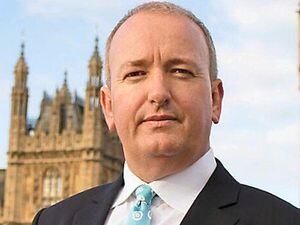
Mark Pritchard, The Wrekin
Mark Pritchard says Theresa May has had a challenging few weeks, but is regaining political strength every day.
“Whilesome newspapers maybe awash with leadership speculation, there is no appetite for a leadership race within the parliamentary party, in the Conservative Party membership, or in the country at large.
“As the UK seeks the best deal from Europe over Brexit, some continuity, for now at least, is the order of the day. A leadership contest would be an unhelpful and unnecessary distraction from the very many pressing challenges our nation faces.
“Of course, this does not stop the unpreparedness by some in Labour to accept the outcome of the general election. The Conservatives won and Labour lost. That is it. Whilst minority government’s are raret o the UK, theye are not rare in Europe or around the workd.
“They are challenging but they still do provide government which works. This Conservative minority government will work.
“Labour should accept the verdict of the people, and work with Conservatives in the national interest – and for the common good. There is much that can bring all the political parties together.
“Continuing to tackle domestic abuse and violence, reforming the equality laws to reduce the stugma of mental illness, and continuing to improve education and social mobility. I am also pleased the Prime Minister will taking racism head on.
“Much has been done to tackle racism, by successive governments, but more still can be done.
“There are also significant national security challenges, both at home and abroad, in order to pay for our domestic and international defence – the UK needs a strong economy. This will not be done by piling up even more debt for our children and grandchildren.
“There needs to be a national conversation about how we continue to pay for our public services whilst ensuring our great nation avoids even more indebtedness.
"The PM is a good person, has the right approach on social inclusion, still has the drive and determination to deliver a caring but responsible Conservative agenda for Britain. "
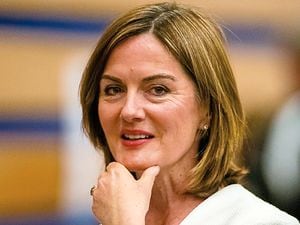
Lucy Allan, Telford
Lucy Allan is full of praise for Prime Minister Theresa May, whom she says ‘deserves’ the country’s support despite facing difficult times.
“Theresa May is doing a very difficult job in exceptionally difficult times. She is doing this job in the service of our country and deserves our support.
“Now that Parliament and government is settling back down into a well-ordered routine, MPs want government to get on with the job and so do those who elected them.
“Right now, people in Telford want to see government tackling the big issues our country faces.
“Brexit negotiations must proceed and our economy must not be allowed to falter as we prioritise jobs and growth.
“The Prime Minister and her ministers have a duty to deliver on last June’s Referendum result. She set out to address the issues that gave rise to the Brexit ‘revolution’ and to tackle the disconnect between the establishment and the people.
“She is doing this on behalf of ordinary working people across the country who feel the establishment does not work for them.
“These are voices that I was elected to represent: ordinary working people who want to get on with their lives, and want to build a better future for themselves and their families.
“That is why I support Brexit and Theresa May’s agenda.
“Unfortunately for those who want to get on with Brexit, many of whom I represent, the General Election did not give her the strong mandate that would have made the task easier.
“She is, however, still duty-bound to deliver a successful Brexit and to build a stronger economy, delivering better living standards, better public services and opportunity for all.
“I know that many former Labour voters in Telford voted Conservative for the first time to support Theresa May.
“They want her to get on with the job of delivering Brexit and running the country.
“That’s what they voted for.”

Philip Dunne, Ludlow
Over the past year Philip Dunne has shown steady support for Theresa May, from her winning of the Tory leadership contest to the mixed result of last month’s general election.
Mr Dunne retained his seat – with the highest majority in the constituency’s history – and also kept his role as Minster of Health in Mrs May’s government.
In recent weeks he re-iterated his support for Mrs May as Prime Minster despite the Conservative’s majority in parliament – unlike his own – coming out significantly reduced after the election. He stressed the tricky and urgent nature of Brexit negotiations ahead said she was “absolutely the right person” to lead the county through them.
Speaking last month he said: “She is the Prime Minister, she’ll be leading the county and she’ll have a strong cabinet who have been preparing for this moment since last June so we know where we’re going and we need to get on with it. She is absolutely the right person to take us forward into these negotiations and to lead the country.”
He has said that even with a reduced majority May still had authority in the forthcoming Brexit negotiations.
He said the election result was “obviously” not what the party had hoped for but that under Mrs May the Conservatives had increased their share of the vote and were still “the largest party by a clear margin” with both the most seat and the most overall votes.
“We know the challenges our country faces over the next few years, the most crucial of which is the critical goal of getting the best possible deal for Britain as we leave the European Union,” he said.
“We need to focus on pressing ahead with these negotiations with the EU now ”
In the leadership contest of 2016 Mr Dunne initially supported then-Work and Pensions Secretary Stephen Crabb but supported Mrs May in the second round after Crabb withdrew from the race.
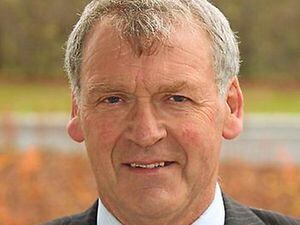
Glyn Davies, Montgomeryshire
Glyn Davies said he was supportive of Theresa May when she was elected Leader of the Conservative Party and Prime Minister a year ago.
“She had been an excellent Home Secretary, and was the obvious choice to replace David Cameron. I continue to support her, and judge her to be the best choice to lead our country through the hugely difficult and complex process of leaving the European Union.
“Theresa May was the first ‘national’ politician to come to Montgomeryshire to support my efforts to become the MP. We have been friends ever since. She has been very accessible to me since I’ve been an MP, and always has time to discuss the issues that matter to me. I could not have hoped for a more supportive Prime Minister.
“Over the last few months the Prime Minister has come under the most enormous pressure, but has shown herself to be a very tough lady. Few politicians would have been able to face up to the relentless criticism she has faced. I greatly admire her resilience and determination.
I’m often asked how long Theresa May will remain Prime Minister. In politics, such questions can never be answered. Certainly she will be our Prime Minister until negotiations to leave the European Union are completed in 2019. No-one knows what the position will be by then.
“Politics across the world has become so unpredictable, even unstable.
“What I know is that Theresa May is a determined Prime Minister, committed to leading a Government for all of the people, with a strong social conscience.
“She knows that none of our public services can be delivered without a strong economy.
“She is strong enough to stand up to the unsustainable demands from every quarter to spend more public money, leaving a massive legacy of debt to future generations.
“She is a good Prime Minister and deserves my total support and she has it."





